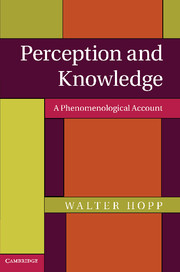Book contents
2 - Experiential conceptualism
Published online by Cambridge University Press: 21 April 2011
Summary
Thus far I have argued that at least some mental states have content, and have endorsed a broadly Husserlian account of what contents are, how they are related to the mental acts whose contents they are, and how they are related to their objects. Briefly, contents are intentional properties of acts, and are those properties in virtue of which acts are intentionally directed upon their objects in the determinate manner that they are. Nothing, however, has so far been said about whether perceptual states are among the mental states with intentional content and, if they are, what sort of contents they have. One idea, motivated by a number of different considerations, is that at least some, and possibly all, of the intentional contents of perceptual experience are conceptual contents. Over the course of the next three chapters, I will consider and reject two versions of what I will call ‘experiential conceptualism’ (EC). According to strong experiential conceptualism (SEC), all perceptual experiences necessarily have intentional content, and their intentional content is exclusively conceptual content. That is, I will understand SEC to claim that the very same type of intentional contents that makes thoughts intentionally directed upon their objects is responsible for perceptual states being directed upon their objects. I will understand weak experiential conceptualism (WEC) as the position that all perceptual experiences necessarily have at least some conceptual content. SEC, but not WEC, is incompatible with the claim that perceptual experiences have nonconceptual intentional content.
- Type
- Chapter
- Information
- Perception and KnowledgeA Phenomenological Account, pp. 37 - 80Publisher: Cambridge University PressPrint publication year: 2011

